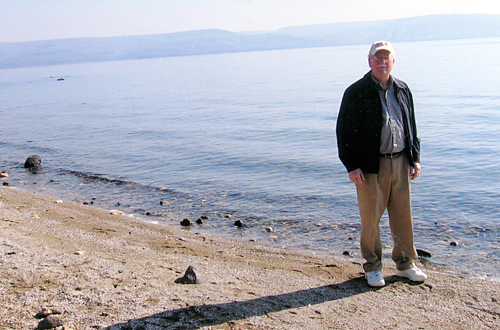In January I traveled with other editors of Southern Baptist newspapers to Israel, my fourth such visit to The Holy Land during my tenure at The Baptist Courier. The department of tourism for Israel invited the editors, though I was anything but simply a tourist. Each of my previous visits to Israel had been a spiritual experience for me and I expected as much this time. In no way was I disappointed.

For a follower of Jesus, a visit to Israel is a pilgrimage. And for our little band of Baptist editors, it was a quick-paced pilgrimage. At the end of a day’s busy activities we usually agreed, “We ran today where Jesus walked.”
And one day, we sailed where Jesus sailed. No part of Israel fascinates and inspires me more than the Sea of Galilee – the area around it and the lake itself, which is fed by the Jordan River. Here, the Bible tells us, Jesus stilled a storm, walked on the water, multiplied the loaves and fishes, and presented his “inaugural address” in what is referred to as the Sermon on the Mount.
The Sea of Galilee also provides the setting for what to me is one of the most significant acts of our Lord at a time when it was most needed and least deserved – the restoration of a dispirited band of disciples who had failed and disappointed Jesus, and who were not having much luck fishing, either. As John describes the scene in chapter 21 of his gospel, Jesus watched the futile fishing efforts of the disciples from the shore before giving them directions for casting their nets. Recognizing their Lord, the disciples hurried ashore where Jesus was already preparing breakfast for them.
It is not hard to imagine what Jesus may have felt like saying to the disciples that morning, but for their sakes did not. He could have chided them for abandoning him during his darkest hour and, while forgiving them, made it clear he could no longer place confidence in them to carry out his commission for the spread of the gospel. Instead, he said, “Come have breakfast.”
John’s gospel then tells us how Jesus focused in on the disciple most in need of the restorative touch of his Lord – the apostle Peter, who had denied Jesus repeatedly. “Do you love me?” Jesus asked him. Each time, Jesus used the word agape for love. It is a Greek word denoting an abiding, sacrificial kind of love dependent on the will more than on the emotions. It is New Testament love that seeks the best for all, even one’s enemies. In answering yes to the question posed by Jesus, Peter used a lesser form of the word love, philos. This is brotherly love. Finally, as Jesus asked Peter for a third time, “Do you love me?” he used Peter’s word, philos.
Could it have been that Peter, perhaps even more acutely aware at that moment of his dismal failure of his Lord, was convinced in his heart that he had no right to speak of such strong love as Jesus had indicated by using the term agape? Still, and we should not miss this point, each time that Peter answered in what one writer described as “less than optimal” fashion, Jesus consistently gave to Peter the spiritual task of tending the flock.
It seems apparent from John’s rendering of this episode in the life of the disciples and the risen Lord that Jesus was willing without hesitation to meet Peter where he was, and in this, you and I can and should find hope for ourselves. The words of Jesus to Peter implied no judgment of his flawed friend and disciple.
On a cold January day, I stood alone at the edge of the Sea of Galilee at the traditional site of the restoration of the apostle Peter and the other disciples, and I thought deeply and with a growing sense of gratitude and unworthiness on words of Jesus spoken more than 2,000 years ago. Later, I read John 21 with renewed appreciation for its message, for its promise. One writer noted that “seldom is grace more glaringly and beautifully on display” than it was on that memorable day when Jesus gave grace at the breakfast table.
